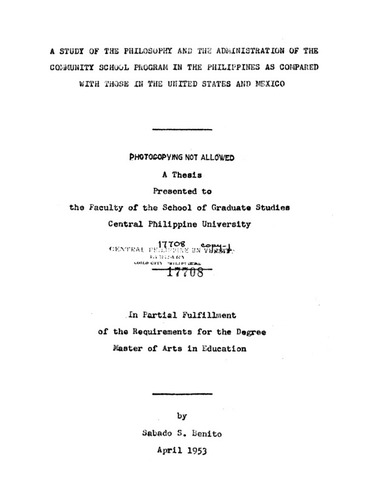Ipakita ang simpleng tala ng item
A study of the philosophy and the administration of the community school program in the Philippines as compared with those in the United States and Mexico
| dc.contributor.adviser | Forbes, Joseph Morris | |
| dc.contributor.author | Benito, Sabado S. | |
| dc.date.accessioned | 2021-12-06T08:11:41Z | |
| dc.date.available | 2021-12-06T08:11:41Z | |
| dc.date.issued | 1953 | |
| dc.identifier.citation | Benito, S. S. (1953). A study of the philosophy and the administration of the community school program in the Philippines as compared with those in the United States and Mexico (Unpublished Master’s thesis). Central Philippine University, Jaro, Iloilo City. | en_US |
| dc.identifier.uri | https://hdl.handle.net/20.500.12852/1766 | |
| dc.description | Introduction | en_US |
| dc.description.abstract | Specific aims of the study were: (1) to investigate the philosophy of the community school in each country; (2) to know the reasons for adopting the community school program in the Philippines, in the United States, and in Mexico; (3) to determine the procedures in the administration of the teaching personnel, the finance, and the curriculum in each country; (4) to find out in which country the administration of the community school program is most adequate and most effective; and (5) to glean out of the experiences in the community school work in the United States and in Mexico those procedures which are best adapted to the Philippine conditions, in order to further implement the community school program in this country. Validation. The community school program is a recent trend in the Philippine educational system. To insure success of the new program with a minimum expenditure of time, money and effort it is imperative and timely to make a study of the basic philosophy and administration of the program in this country and to compare it with those in the United States and Mexico, where the community school program has been well developed. It pays to profit from the bitter and pleasant experiences, the failures and successes of those countries developing the community school program. It is worthwhile to learn of their practical and scientific approaches to the community school. The Philippines is economically poor. Almost half of the population is illiterate. Society has been stratified because of the great differences in economic and cultural background. There are the poor who are living wretchedly and the elite who have no concern for lifting their fellowmen out of poverty and ignorance. At the top are the big landowners and moneyed business men whose spirit is gross with avarice. The hope of welding together these people is through the community school program which seeks to promote the general welfare of the people, particularly the rural populace. The alms of the community school, promoting wholesome and abundant social and economic living, developing a literate, healthy resourceful and creative citizenry, can only be accelerated when the school administrator and the community leader are fully imbued with the right spirit and understand the basic steps in launching the community school program. | en_US |
| dc.format.extent | 209 leaves | en_US |
| dc.language.iso | en | en_US |
| dc.subject.ddc | GSL Theses 378.242 B43 | en_US |
| dc.subject.lcsh | Community schools | en_US |
| dc.subject.lcsh | Community schools--Administration | en_US |
| dc.subject.lcsh | Philippines | en_US |
| dc.subject.lcsh | United States | en_US |
| dc.subject.lcsh | Mexico | en_US |
| dc.subject.lcsh | Education--Philosophy | en_US |
| dc.subject.lcsh | Community schools--Philosophy | en_US |
| dc.title | A study of the philosophy and the administration of the community school program in the Philippines as compared with those in the United States and Mexico | en_US |
| dc.type | Thesis | en_US |
| dc.description.bibliographicalreferences | Includes bibliographical references | en_US |
| dc.contributor.chair | Nelson, Linnea A. | |
| dc.contributor.committeemember | Catedral, Alfredo P. | |
| dc.contributor.committeemember | Ortigas, Irene L. | |
| dc.contributor.committeemember | Drilon, Rex D. | |
| dc.contributor.department | School of Graduate Studies | en_US |
| dc.description.degree | Master of Arts in Education | en_US |


